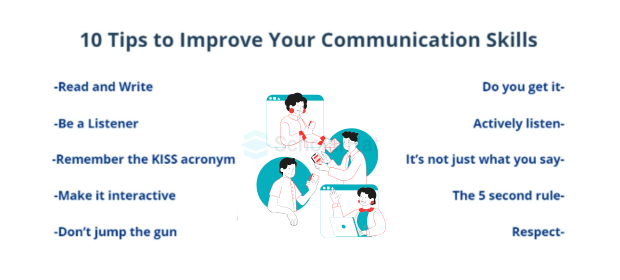21
Dec10 Tips to Improve Your Communication Skills
To have any form of communication we have to have 2 things, a transmitter or sender and a receiver or recipient. The forms of communication are spoken, written, and through gestures and body language. This article will help you understand and put into practice the skills you need to develop and sustain excellent communication in the work place.
What is Communication?
To have any form of communication we have to have 2 things, a transmitter or sender and a receiver or recipient. The forms of communication are spoken, written, and through gestures and body language. By communicating we create and build up the various kinds of relationship within our chosen domain, be they business, work, social etc.
Why Communication value to us?
As mentioned above communicating is how we share and disseminate ideas, thoughts and projects etc. Therefore acquiring communication skills help us in a variety of ways, socially, in the work environment, in business, school, college, university and so on. Even though the areas where good communication will benefit us are diverse there are some fundamental points which will be of general use. The key aim will be to ensure that you come across as confident, friendly, professional, clear, and trustworthy.
Good communication skills are listed in recent global surveys as the number one feature sought in interviews. (Source: National Association of Colleges and Employers). Hence it isn’t difficult to understand why communication needs to be top on your list of skills to acquire. Whether you are ramping up for job interviews, preparing for meetings, or just feel you need to be better at it, good communication is crucial.
Tips to improve your communication skills?
In order to keep things clear and simple we have put together a set of 9 strategies and practices that will definitely reap rewards in communicating successfully.

Read and Write
Read whatever you can, analyze it, study it. Focus on work by successful communicators, choose politicians, scholars etc. Ask yourself whether you understand clearly what they are writing about. You should choose topics that you are interested in or that relate to the field you are in so that you fully engage with the writing. Write for yourself, no matter what you write about, be it a diary, journal, practice letter or email make sure it’s clear and conveys the message effectively. You should proof read everything you write and check for grammar, spelling, and structure.
Be a Listener
Listen for fun and learning, it’s important to enjoy what you are listening to, so as with writing select topics you like. There are numerous vehicles through which you can access the spoken word like YouTube, blogs etc. Consider listening to speeches by well known orators.
Remember the KISS acronym
Keep it short and simple (KISS), In terms of language, vocabulary, and grammar use straightforward forms, Don’t try to be clever, your aim is to get a message across, not to show that you have eaten a dictionary for breakfast.
Make it interactive
Make a connection with your audience by being inclusive, ask questions, so they feel they are a part of what you are saying or writing, ask them for opinions and request feedback on your topic. Remember communication is a two way street.
Don’t jump the gun
In terms of listening to people and when responding don’t think of it as arace to get your point across, take your time and consider carefully what you want to say and how you want to say it. Ensure that you fully understand what has been said, if you don’t ask for clarification, this will impress the speaker by showing you are concentrating and that you want to respond appropriately.
Do you get it
In addition to the above ensure that your recipient understands you, don’t take it for granted that they will just because you understand it, and don’t be judgmental, it’s not their fault if your message isn’t clear, look for ways to paraphrase what you say or write which will give clearer picture for your audience, remember KISS.
Actively listen
One of the key things with listening is that we tend to listen only to reply rather than to understand and learn, so pay attention, don’t concentrate on what you want to say in response listen, think, then speak.
It’s not just what you say
Over the last decade or more body language has gained a strong foot hold in communication and it is highly regarded as a key skill, it has been stated that 65% of our communication id nonverbal. Therefore, make sure you are giving out the right signals and in addition look for the signals your audience is giving out.
The 5 second rule
Along with body language eye contact is essential, when we speak to someone the key area we look at are the eyes, often called the windows to the soul. If you don’t maintain eye contact it will seem you are not paying attention, or you are bored, fake, untrustworthy, so don’t look around the room, gaze wistfully out of the window or play with pens or your phone (as far as your phone is concerned TURN IT OFF). However, what we don’t want to is to stare endlessly at the listener, this can be very intimidating and unnerving, we want the listener to feel comfortable not that they are being interrogated by the police. The way to avoid this is by using the 5 second rule, simple maintain eye contact for a count of 5 seconds then glance away, look briefly across the room, or at the desk, this breaks the feeling of being stared at.
Respect
As mentioned earlier communication involve more than one person, you are transmitting and the other or others are receiving, and although you want to get your message across you should respect and consider the requirements of your recipient. Everyone has a different perspective, so allow time for your audience’s responses, questions and views, be polite and also set the tone by carefully researching the background of your audience whether is 1 person or 100 people. So, these are the key 9 points which will help you communicate, not only communicate successfully in terms of your needs and confidence but also by making your audience feel comfortable, well informed and considered.
Summary
I hope above tips will help you to improve your communication skills.









